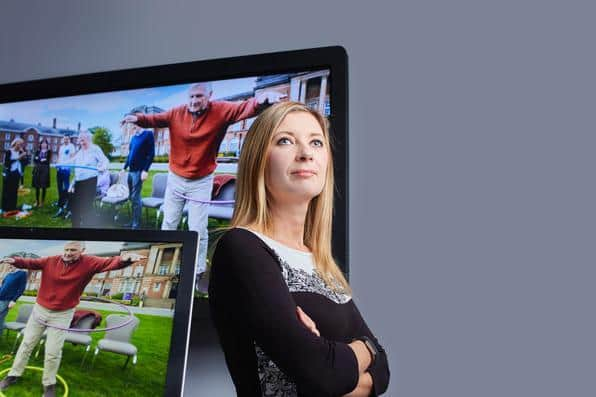Leeds Beckett University launches new Good Practice Guide to help people living with dementia get access to better treatment
and live on Freeview channel 276
Many people who receive a dementia diagnosis report feeling abandoned and unsupported.
A new resource from Leeds Beckett University (LBU) is going to help them by offering guidance to Memory Assessment Services (MAS) who support those with dementia.
Advertisement
Hide AdAdvertisement
Hide Ad

MAS provides a specialist assessment and diagnosis and enables people with dementia and their families to access appropriate treatments, interventions, and support.
The university’s Centre for Dementia Research has been commissioned by NHS England and Improvement Cymru to put together a best practice guide for Memory Assessment Services (MAS).
The research has shown that MAS often work differently across all regions of England and Wales including where they are hosted, what staff roles they have available and what services they provide.
Jill is supporting her husband Steve who has been diagnosed with vascular dementia.
Advertisement
Hide AdAdvertisement
Hide AdThey haven’t had a very positive experience through their local MAS and feel this guide is important for helping all services to provide better support to those who access them.
“There’s been no follow-up whatsoever", Jill said.
"It was just you’ve got vascular dementia, get on with your life. I don’t even know if we’ve been discharged, I just know that we’ve never heard from another soul."
Steve says better communication is essential.
He added: “I think one thing that would be very useful would be if they say, ok we’ll see you again in six months or three months or a year.
"At the moment we’re floating around. I’m not sure where I am, sometimes I’m really good, sometimes I’m not quite as good as I think I am, but if somebody said, right don’t worry about it we’ll come and see you in about a month or three months or whatever, at least there’s something there that’s concrete and you know it’s good to be there and that’s very reassuring.”
Advertisement
Hide AdAdvertisement
Hide AdProfessor Claire Surr, from the School of Health at LBU, who led the research said: “MAS often work differently across all regions of England and Wales including where they are hosted, what staff roles they have available and what services they are commissioned to provide.
It is vital that despite these differences people who access MAS services all get the best care and support, where this is provided in-house by the MAS or by a variety of partners working across a local area.
“The ‘Taking Memory Assessment Services into the Future’ good practice guide was developed with people who have accessed MAS and with experts in professional roles in or related to MAS services.
"It will help MAS who wish to develop their practice to identify areas that they might seek to improve and ways they might approach this. It is designed to be used flexibly by the services and to inspire them and encourage innovation and shared learning.”
Advertisement
Hide AdAdvertisement
Hide AdJoanna is caring for her husband Ananga who is living with dementia.
She welcomes the guide.
“Anything I think that helps doctors to look at it not from a medical perspective but holistically from a people perspective is really, really brilliant", Joanna said.
"Anything you can do to help them see us as people not statistics would be fabulous. I’ve had periods where quite frankly I could just sit and cry because I didn’t know where to go, who to talk to, what to do and if it weren’t for outsider organisations, I don’t where we’d be.
"I think if we can put a good guide together that lets them realise we’re not statistics, we’re real people trying to have a real life and dealing with something that we know is not easy to deal with, that would be wonderful.”
Advertisement
Hide AdAdvertisement
Hide AdProfessor Alistair Burns, National Clinical Director for Dementia and Older People’s Mental Health for NHS England and Improvement said: “Improving the lives of people with dementia, their families and carers is a priority for NHS England.
"It is our ambition that, as a minimum, two thirds of people with dementia should receive a formal diagnosis and accompanying high quality post diagnostic support. A timely diagnosis and support are key aspects of improving the quality of care for people with dementia, their families, and carers.
"For many, assessments and diagnoses begin in memory clinics where they can have access to a multi-disciplinary team.
"Our aspiration is that by showcasing this good practice, it will inspire others and lead to lasting improvements in care for people with dementia, their families and carers."Support the YEP
Advertisement
Hide AdAdvertisement
Hide Adand become a subscriber today. Enjoy unlimited access to local news and the latest on Leeds United, With a digital subscription, you see fewer ads, enjoy faster load times, and get access to exclusive newsletters and content. Click here to subscribe.
Comment Guidelines
National World encourages reader discussion on our stories. User feedback, insights and back-and-forth exchanges add a rich layer of context to reporting. Please review our Community Guidelines before commenting.
